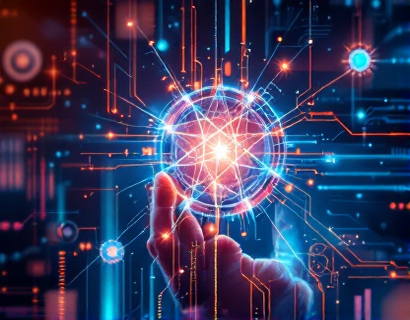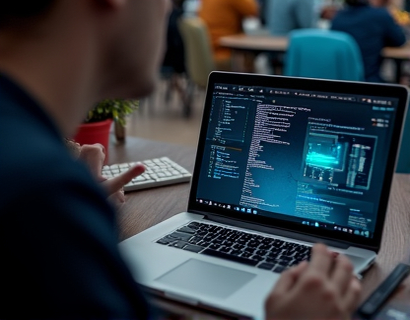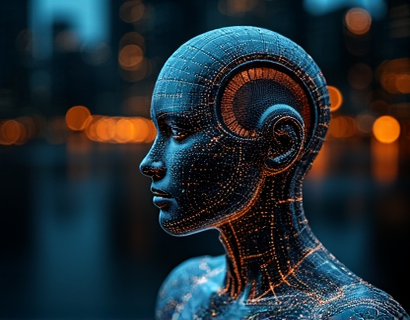Revolutionizing Digital Engagement: The Synergy of Crypto and AI
The intersection of cryptocurrency and artificial intelligence (AI) is ushering in a new era of digital engagement, transforming the way we interact with technology and each other. This fusion of technologies is not just a novel concept but a powerful force driving innovation and growth across various sectors. As we delve into this transformative landscape, it's essential to understand how these advancements are reshaping the digital ecosystem and what it means for users, developers, and businesses alike.
The Foundations of Cryptocurrency and AI
Cryptocurrency, since its inception with Bitcoin in 2009, has evolved from a niche digital currency to a robust technology underpinning a vast ecosystem. At its core, cryptocurrency leverages blockchain technology, a decentralized and transparent ledger system that ensures security and trust without the need for intermediaries. This technology has paved the way for a multitude of applications beyond finance, including supply chain management, identity verification, and smart contracts.
Artificial intelligence, on the other hand, refers to the simulation of human intelligence processes by machines, particularly computer systems. These processes include learning (the acquisition of information and rules for using it), reasoning (using rules to reach approximate or definite conclusions), and self-correction. AI has made significant strides in areas such as natural language processing, computer vision, and predictive analytics, enabling machines to perform tasks that traditionally required human intervention.
Enhancing User Interactions through AI-Driven Crypto Solutions
The combination of cryptocurrency and AI is particularly potent in enhancing user interactions. AI algorithms can analyze vast amounts of data to provide personalized experiences, optimize user interfaces, and predict user behavior. In the context of cryptocurrency, this means creating more intuitive and user-friendly platforms for trading, investing, and managing digital assets.
For instance, AI-powered chatbots can offer real-time customer support, answering queries and providing guidance to users navigating complex crypto markets. These chatbots can understand natural language, learn from interactions, and adapt to user preferences, making the crypto experience more accessible and less intimidating for newcomers.
Security and Fraud Detection
Security is a paramount concern in the crypto space, and AI plays a crucial role in enhancing it. Machine learning models can detect anomalies and patterns indicative of fraudulent activities, such as money laundering or phishing attacks. By continuously learning from new data, these systems become more adept at identifying and mitigating threats in real-time.
Moreover, AI can improve the security of blockchain itself. Techniques like anomaly detection and predictive modeling can help identify potential vulnerabilities in smart contracts and network protocols, allowing developers to address these issues proactively. This not only safeguards user assets but also builds trust in the crypto ecosystem.
Decentralized Finance (DeFi) and AI
Decentralized Finance (DeFi) is a rapidly growing sector within the crypto world, offering traditional financial services on blockchain platforms. AI enhances DeFi by optimizing trading strategies, risk management, and portfolio management. AI algorithms can analyze market data, predict price movements, and execute trades with minimal human intervention, potentially increasing returns and reducing risks.
Furthermore, AI can facilitate the creation of more sophisticated financial instruments, such as decentralized autonomous organizations (DAOs) and tokenized assets. These innovations democratize access to financial services, allowing individuals and businesses to participate in the global economy without traditional barriers.
Enhancing Digital Identity and Privacy
Digital identity and privacy are critical concerns in the digital age, and the combination of crypto and AI offers promising solutions. Self-sovereign identity (SSI) frameworks, powered by blockchain, allow individuals to control their personal data and authenticate themselves without relying on centralized authorities. AI can enhance SSI by providing advanced encryption methods and secure data management practices.
AI-driven privacy tools can also help users protect their data from unauthorized access and misuse. For example, differential privacy techniques can enable data analysis while ensuring individual privacy is maintained. This synergy between crypto and AI empowers users to have greater control over their digital lives.
Smart Cities and IoT Integration
The integration of cryptocurrency and AI extends beyond digital transactions and financial services. In the realm of smart cities and the Internet of Things (IoT), these technologies can optimize resource management, enhance public services, and improve urban living conditions. AI can process data from various IoT devices to predict maintenance needs, manage traffic flow, and monitor environmental conditions.
Crypto can facilitate secure and transparent transactions in these systems, ensuring that data and resource exchanges are trustworthy and efficient. For instance, tokenized incentives can encourage participation in community-driven projects, such as renewable energy initiatives or waste management programs. This creates a more sustainable and resilient urban environment.
Challenges and Considerations
Despite the numerous benefits, the integration of crypto and AI is not without challenges. Regulatory uncertainties, technological complexities, and ethical concerns must be addressed to ensure the responsible development and deployment of these technologies. Privacy issues, in particular, require careful consideration, as the combination of AI and crypto can potentially lead to more invasive data collection and analysis.
Moreover, the energy consumption associated with blockchain and AI processes is a significant environmental concern. Innovations in consensus mechanisms and energy-efficient algorithms are necessary to make these technologies more sustainable. Collaboration between governments, industry stakeholders, and the research community is essential to navigate these challenges and harness the full potential of crypto and AI.
Future Prospects and Innovations
Looking ahead, the future of crypto and AI is bright, with numerous innovations on the horizon. The development of quantum-resistant algorithms will ensure the long-term security of blockchain systems against quantum computing threats. Advancements in AI, such as explainable AI (XAI), will enhance transparency and trust in AI-driven decision-making processes.
Furthermore, the integration of AI with other emerging technologies, like augmented reality (AR) and virtual reality (VR), will create immersive and interactive experiences in the crypto space. Users can engage with digital assets in new and exciting ways, from virtual trading floors to decentralized social platforms.
In conclusion, the convergence of cryptocurrency and AI is revolutionizing digital engagement, offering unprecedented opportunities for growth, connectivity, and innovation. As these technologies continue to evolve, they will play a pivotal role in shaping the future of the digital ecosystem, making it more secure, efficient, and user-centric.










































